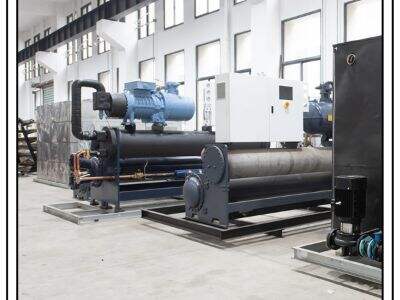Chiller Efficiency and Condenser Pressure Fitting the perfect curve for maximum efficiency
How to Optimize Chiller Performance: The Missing Link Maximizing chiller efficiency is key to the operation of any chiller plant, and one major factor that can influence chiller efficiency is condenser pressure control. Well controlled condenser pressure is critical to achieving optimal performance, lower energy consumption and cost reduction. In this article you will learn the significance of control of chiller condenser pressure in chiller systems including how and why you need to maintain ideal condenser pressure for maximum system performance.
Role of Condenser Pressure to Enhance Chiller Performance
The condenser pressure is a key factor for a chiller plant operation. It cools the refrigerant by pulling the heat from it, so it can flow through the system and cool the area as it should. With the ability control the pressure of the condenser, chiller systems are more efficient and this translates to the recirculating system not consuming as much power and in turn life of downstream equipment is increased. When the condenser pressure is either too high or too low, there can be a reduction in performance, increased energy consumption and even failure of the system.
The Effect of Condenser Pressure Control on Energy Consumption
Correct management of condenser pressure could affect the energy consumption of a chiller plant. By maximizing condenser pressure, the entire system can then be running at its most efficient levels, using less power to deliver the desired cooling. If condenser pump chiller is not well-controlled, however, the chiller plant may have to work to harder to meet the same level of cooling, and use more energy in the process, leading to higher utility bills. By adjustment of the condenser pressure control, large energy savings can be gained from chiller plants.
The Significance of Correct Condenser Pressure Control in Chiller Plants
Good control of condenser pressure is critical for chiller plant performance and durability. Too little or too much pressure can cause excessive wear and tear on chiller parts and result in a unit that is less energy-efficient and prone to failure. By establishing a typical condenser pressure control scheme, chiller operators can improve system efficiency and extend equipment life, which, in turn translates to reduced maintenance costs and system downtime.
Tactics for Sustaining Peak Condenser Pressure to Optimize Your Chiller’s Performance
A number of strategies may be employed to realize the maximum chiller performance by controlling the condenser pressure. One useful way to do is to modulate condenser pressure depending on conditions and load. By maintaining the condenser pressure in its ideal range, chiller plants are able to perform with a higher level of efficiency and performance. These efforts, along with various preventive maintenance tasks, such as cleaning condenser cooling water coils and testing refrigerant level, can assist in keeping pressure at its correct levels and prolong the system.
appropriate control of condenser pressure is very important in the effort to optimize chiller performance and minimize energy usage. By learning about how condenser pressure impacts how chillers perform, you can use the right control strategies and maintenance to run your chillers at the most efficient level for peak performance and greatest savings. Condenser Pressure Control by Yide When corrected, the design and application of chillers can result in efficient and reliable operation which is essential for cooling needs of many systems.
Table of Contents
- Chiller Efficiency and Condenser Pressure Fitting the perfect curve for maximum efficiency
- Role of Condenser Pressure to Enhance Chiller Performance
- The Effect of Condenser Pressure Control on Energy Consumption
- The Significance of Correct Condenser Pressure Control in Chiller Plants
- Tactics for Sustaining Peak Condenser Pressure to Optimize Your Chiller’s Performance


